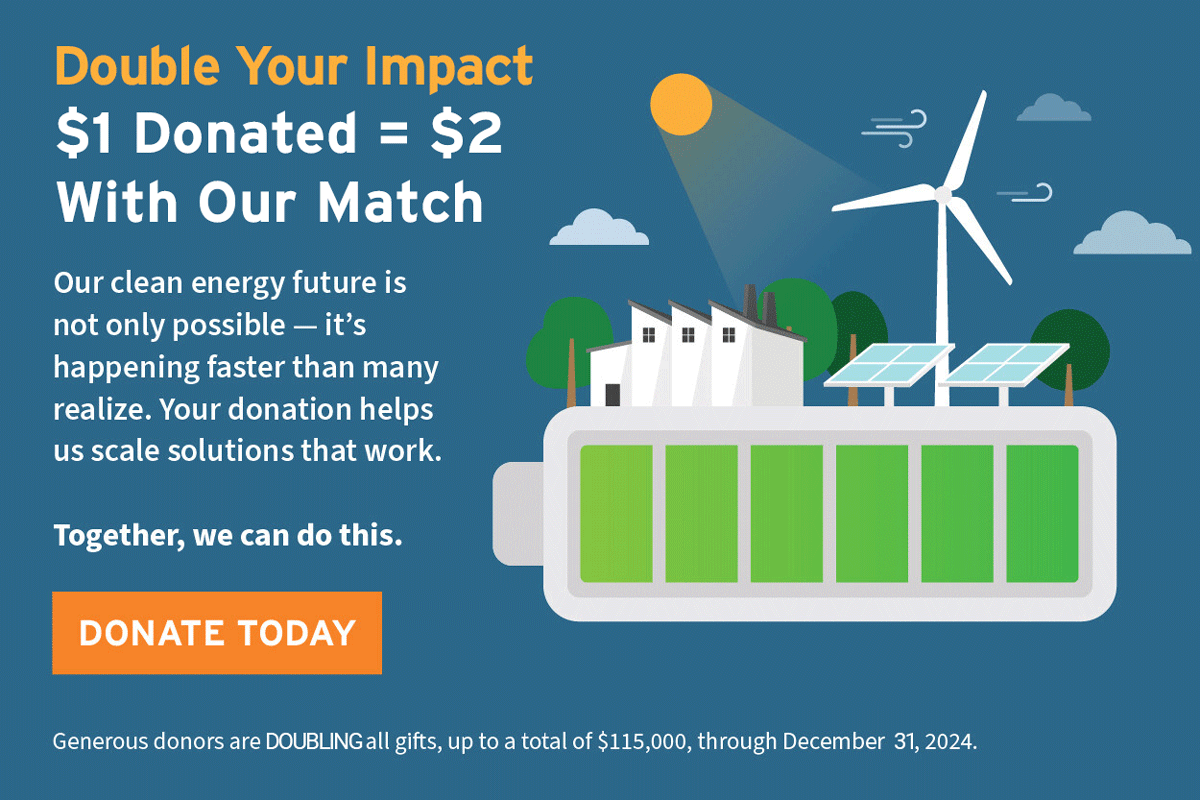2020–2021
Annual Report
Energy. Transformed.
RMI’s 2020–2021 Annual Report features the progress on the global energy transition made possible by our donors.
Download
A Letter from the CEO

In August of 2021, the Intergovernmental Panel on Climate Change (IPCC) found unequivocally that emissions have altered our planet, far more aggressive action is needed to limit catastrophic climate change, and time is running out. Antonio Guterres, the Secretary General of the United Nations, referred to the report as “a code red for humanity.” The IPCC’s findings lay out the stark reality that we are not on track to achieve the 1.5°C climate target set by the Paris Agreement. In some ways, the sustainable energy future that we seek seems further out of reach than ever.
In the face of these brutal facts, one could easily lose hope. But we cannot, and we need not. Because more than ever, we are starting to see that much of the sustainable energy future we believe in is in fact coming into reach. For decades we have said that the energy transition will happen faster and be less costly than many people think. Increasingly, our predictions are becoming reality. Clean energy solutions have consistently become more cost-effective and have been deployed more quickly than nearly every forecast has predicted. And now, the pace of the energy transition is becoming unstoppable.
Commercial businesses and financial institutions are stepping up in a big way to address the climate crisis. We’ve seen 27 financial institutions that control more than $31 trillion in assets sign sectoral decarbonization agreements, and the founding members of RMI’s Center for Climate-Aligned Finance have committed more than $4.3 trillion to finance the energy transition. Some of the world’s largest companies have committed to only use renewable electricity, purchase sustainable biofuels for airplanes, switch to all-electric fleets, and bring their building portfolios to net-zero carbon.
RMI has stepped up in a big way too. During this past year, we have done a great deal to address the crisis before us and amplify our impact. Our work across the four key sectors of the energy system, market catalysts, and global geographies is all focused on hitting the 1.5°C target. We continue to focus on energy efficiency, driving the electricity system to rapid decarbonization, supporting the move toward electrification in cars and buildings, and supporting the global shift to low carbon in heavy industries across the world.
We’ve dramatically scaled the way we collaborate. We work with other NGOs, companies, financial institutions, and policymakers at all levels to transform the energy system together through stronger, more influential global partnerships. For instance, the Mission Possible Partnership works with fellow NGOs, large companies across supply chains, financial organizations, and policymakers to agree on and implement pathways to net zero for some of the most difficult to decarbonize sectors of the economy.
We have supercharged innovation enhancing the ways in which we unleash new business models and technologies into the market. Efforts like Climate TRACE, the Energy Web Foundation, and Third Derivative all focus on ways to leverage innovation, from tracking global emissions data in real time to integrating distributed renewable electricity with blockchain technology.
Most importantly, we have done all this with unparalleled support from our donors. There is a growing commitment among philanthropists, business leaders, financial organizations, and policymakers to address the climate crisis in this decisive decade. Your commitments have given us the ability to scale our team not just for the upcoming year, but also for the urgent work ahead of us in the next several years.
We don’t have to wait to be told how to transform our societies. We can go out and seize the opportunities ourselves. A global transformation is already well underway and together we will work tirelessly to make change happen.
Jules Kortenhorst
Chief Executive Officer

Emeritus Insights
RMI Cofounder, Chairman Emeritus, and Trustee Amory Lovins continues to make a mark on the energy transition with groundbreaking thought leadership.
Sectors. Transformed.
Decarbonizing energy—and quickly—is essential to achieve a 1.5°C future. We are driving the transition to clean, renewable electricity to power and fuel mobility, buildings, and industry.
Communities. Transformed.
At RMI we realize the importance of ensuring the energy transition benefits all. We work to provide all communities with resilient, reliable, and clean energy to make a difference in people’s lives. Below are only some of the real changes we made this past year to help communities that would otherwise be left behind in the clean energy transition.
Markets. Transformed.
When new business models take off, they do so at a pace unmatched by other forces in society. That’s why we’re leveraging powerful financial and market forces to accelerate decarbonization globally.
Policy. Transformed.
This past year RMI focused on strategic ways to advance smart climate policies that also help advance social and economic outcomes. In the United States, China, India, and Africa, we provided insights to policymakers to promote clean energy and resilient communities.
Data and Technology. Transformed.
Technology innovation and increased data transparency are essential to limit warming to 1.5°C. RMI is helping to surface and scale climate-critical technologies, while also accelerating decarbonization through improved climate data, insights, and action.
Our Team. Transformed.
One of RMI’s most valuable assets is its unrivaled team. Our staff is composed of individuals who are applying their passion, bold ideas, and diverse expertise to address the climate challenge. Over the past year, our team has grown substantially—empowering RMI to adequately meet the most ambitious challenge of our time.
Philanthropy. Transformed.
Technology innovation and increased data transparency are essential to limit warming to 1.5°C. RMI is helping to surface and scale climate-critical technologies, while also accelerating decarbonization through improved climate data, insights, and action.

